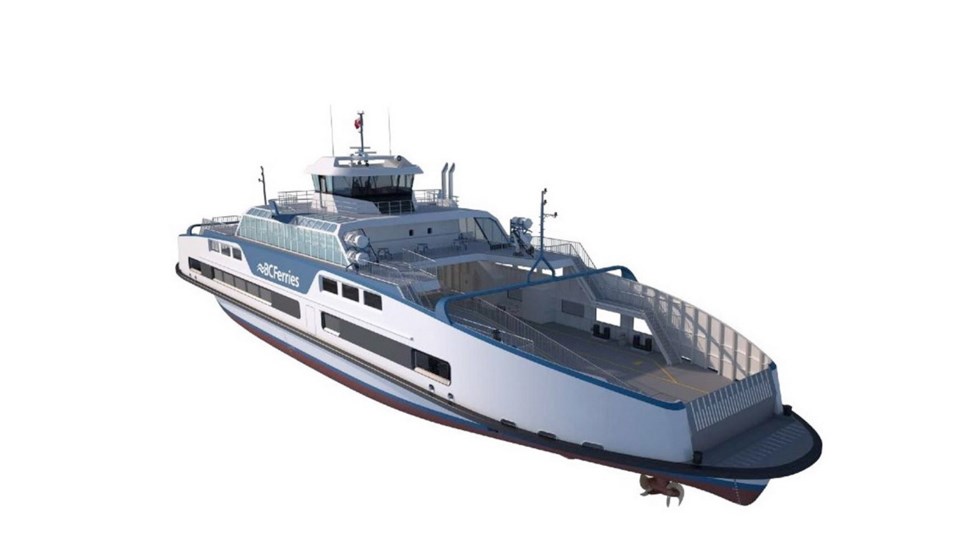B.C. Ferries is adding a new class of small ferry to its fleet and is starting by ordering two through a shipbuilder headquartered in the Netherlands.
The electric-diesel ferries will be built in Romania at one of the more than 30 international yards owned by shipbuilding giant Damen Shipyards Group.
They will be serviced under warranty by Point Hope Maritime on Harbour Road in Victoria, where workers will receive training from Damen.
“We are excited that this project continues our commitment to coastal communities to replace aging ships with standardized vessels, which will reduce costs and improve operations,” Mark Collins, B.C. Ferries president, said Tuesday.
None of the five Canadian shipyards that were shortlisted for the job submitted bids in the final request-for-proposal process, B.C. Ferries said.
One of the new ferries will serve the Powell River-Texada Island route, replacing the oldest vessel in the fleet — the 59-year-old North Island Princess, which will be retired.
The other will take over the Port McNeill-Alert Bay-Sointula route from the Quadra Queen II, built in 1969. That ferry will stay on as a relief vessel and permit the retirement of the 53-year-old Howe Sound Queen.
Each of the new ferries will be able to carry at least 44 vehicles and up to 300 passengers and crew, an increase from the older ferries’ capacities.
The new vessels will be able to travel at 13 to 14 knots (a knot refers to one nautical mile per hour), up from the 10 to 11 knots typical on the older ferries.
This means that if there is a delay, the new ferries will be better able to make up time, Collins said.
A design-build, fixed-price contract has been struck for the new ferries, which will be the first in a new class of smaller vessels. B.C. Ferries’ existing fleet consists of many types of ships. Money can be saved and efficiency improved by having standardized vessels, Collins said.
Further, the batteries and ultra-low-sulphur diesel fuel, along with a quieter operating system, all bring environmental benefits, he said.
As many as seven or eight of these smaller vessels could be built in coming years, as existing ferries age, Collins said.
No name has been given to this class yet, Collins said.
The entire cost of the two-vessel project comes to $86.5 million. A federal contribution will help defray about a third of the cost.
Precise construction contract values are not released because of competition in the shipbuilding sector, but Collins said the construction portion is more than three-quarters of the total amount.
Ferries sought expressions of interest in March 2016. It received 28 national and international responses and shortlisted a dozen shipyards, including five from Canada. The final request for proposals from the shortlisted group attracted four responses that complied with B.C. Ferries’ requirements, the corporation said. None were from Canada.
Damen has built other vessels that are operating in B.C., so it is familiar with Canada’s regulatory environment, Collins said.
New ferries are expected to last 45 years, he said.
These two vessels represent the latest offshore construction contracts for B.C. Ferries. Repairs and maintenance are carried out at B.C. yards.
Three new Salish-class ferries are in B.C. after being built in Poland. The Salish Raven is scheduled to arrive at Ogden Point in Victoria this morning.
A decade ago, three Coastal class ferries were built in Germany. And the same Polish shipyard that built the Salish ferries won the contract to convert B.C. Ferries’ two Spirit-class vessels to a dual-fuel system, using liquefied natural gas and diesel.
The Salish ferries have arrived on their own power, but Collins expects that the two smaller Romanian-built ferries will be towed here by a barge.
Locally owned Point Hope Maritime welcomes its agreement with Damen to provide technical and warranty support for the new vessels. Riccardo Regosa, Point Hope manager, spent 18 years working for Damen, including time at its Romanian yard.
“Our service teams will be trained and familiarized by Damen, as the vessels will be equipped with high-tech, hybrid diesel-electric battery-powered propulsion systems,” Regosa said. “Transferring knowledge from the shipbuilders to our local engineers is a key element in soft-landing this new technology.”
The work will bring a new activity and expertise into the shipyard, Regosa said. The yard will develop special teams dedicated to this type of service.
He informed workers Tuesday morning about the new contract and said “everybody’s excited.”



